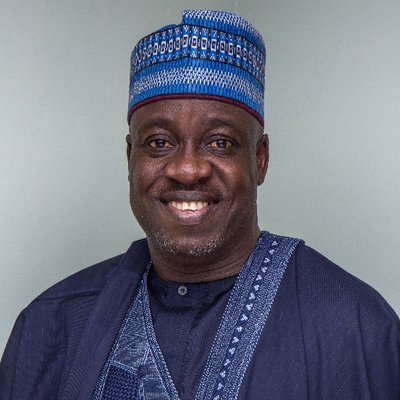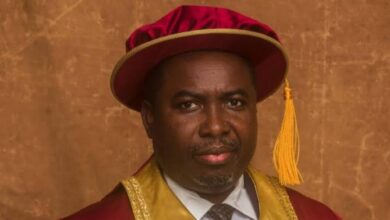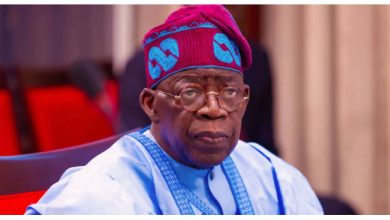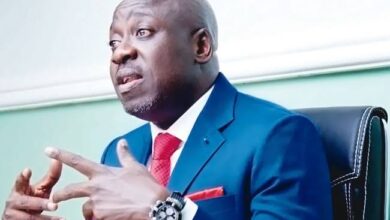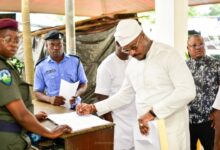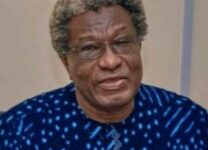CommentsGeneral NewsNews
STATEMENT DELIVERED BY HIS EXCELLENCY, MUHAMMADU BUHARI PRESIDENT OF THE FEDERAL REPUBLIC OF NIGERIA AT THE GENERAL DEBATE OF THE 75TH SESSION OF THE UNITED NATIONS GENERAL ASSEMBLY 22ND SEPTEMBER 2020
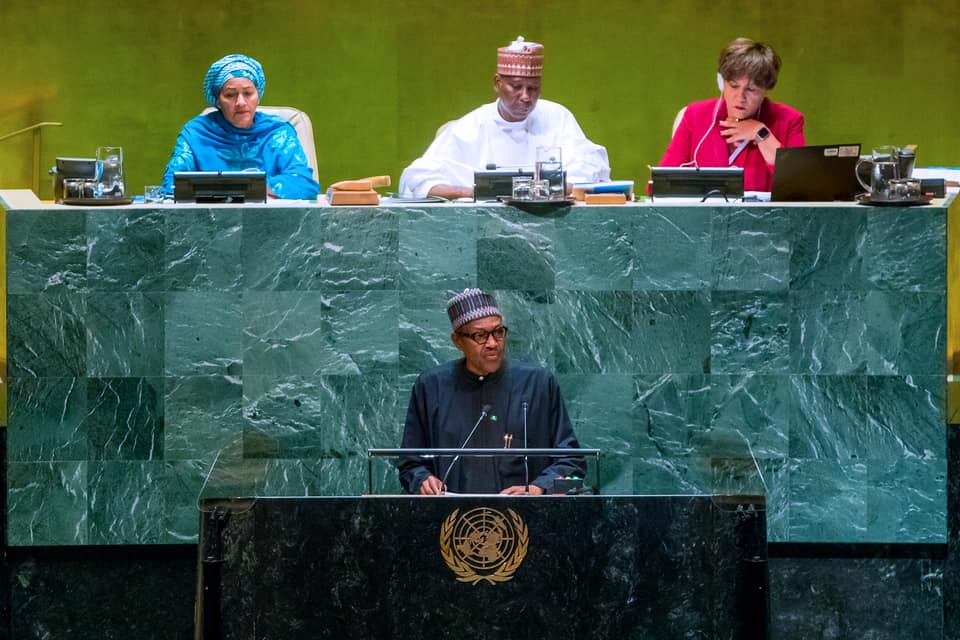
* Mr. President,
* Heads of State and Government,
* Secretary-General,
* Distinguished Delegates,
* Ladies and Gentlemen,
Let me on behalf of the Government and good people of Nigeria, congratulate you on your well-deserved election as President of the 75th Session of the United Nations General Assembly (UNGA). I would like to assure you of Nigeria’s readiness to avail the United Nations all necessary cooperation needed for the fulfillment of your mandate.
2. I wish to also thank the General Assembly for the support accorded His Excellency, Tijjani Muhammad-Bande during his tenure as President of the 74th Session of the General Assembly.
3. We acknowledge the accomplishments of the Assembly under his able leadership, particularly his efforts on attacking global poverty through the Global Coalition on Poverty Eradication.
4. We also commend the tremendous efforts of His Excellency, Antonio Guterres, Secretary-General of the United Nations, in steering the affairs of the organization during this challenging period of the Coronavirus pandemic, as well as his strong commitment to making the UN more efficient and responsive in its international responsibility.
Your Excellencies, Distinguished Delegates,
5. It is my privilege to use this opportunity to congratulate Member States on the 75th Anniversary of the United Nations. Over the past seven decades, the United Nations, as the People’s Assembly, has helped to stabilize the global community.
6. In addition to international peace and security, the UN has undertaken programmes on poverty eradication, women’s empowerment, youth development and humanitarian emergencies.
7. The theme of this year’s General Assembly – “The Future We Want, The United Nations We Need: Reaffirming Our Collective Commitment To Multilateralism – Confronting Coronavirus Through Effective Multilateral Action”, is indeed most appropriate and timely, as it captures our common desire for a renewed and revitalized organization in need of multilateral approaches to the many challenges facing the world.
THE FUTURE WE WANT
8. As we reflect on the future we want and the United Nations we need, we must realize that the peoples of the world not only look up to us: they count on us. If the United Nations system cannot mobilize the world to marshal out a truly effective and inclusive response to the Coronavirus pandemic, then the United Nations would have failed in its core mission of giving expression, direction and solution to the yearnings of the international community.
Excellencies,
9. The future we want must guarantee human rights, human dignity, human prospects and prosperity. The principles of “Leaving No One Behind and Doing No Harm” must be expressed through accountability, strategic growth initiatives and elimination of threats of all kinds.
10. In our quest to provide a future of hope and prosperity for Nigerians, our administration has embarked on measures to ensure enhanced national resilience. We intend to achieve this through the implementation of the Economic Sustainability Plan and the Medium Term National Development Plans for the period 2020-2025 and 2026-2030. We expect that these ambitious initiatives will deliver sustainable economic growth and development to Nigeria.
THE UNITED NATIONS WE NEED
11. Predicated on the values that inspired its creation, the United Nations we need has to remain an agent of progress, by giving expression to the tenets of multilateralism, solidarity and international cooperation. It is within the context of this rules-based multilateral order that the world can find solutions to its many problems.
CONFRONTING COVID-19 THROUGH EFFECTIVE MULTILATERAL ACTIONS
12. The world is currently in the grips of the Coronavirus pandemic. Regrettably, our communities and countries are losing lives. The Coronavirus pandemic has devastated the world economy and strained the capabilities of the health system of many countries, including our own country.
13. In the aftermath of Coronavirus outbreak in Nigeria, we prioritized vulnerable groups, including women, children, older persons and the unemployed, in our efforts to provide medical and social assistance to cushion the socio-economic effects of the disease.
14. Accordingly, we have expanded our National Social Register, to include an additional 1 million Nigerians. Our National Social Investment Programme (NSIP) has been the vehicle for reaching out to the poor and vulnerable members of the Nigerian population, as well as providing cover for over 22 million households.
15. I use this opportunity to commend the efforts of the United Nations and the World Health Organization in combating the Coronavirus pandemic.
16. I note, with appreciation, the $2 Billion United States Dollars Global Humanitarian Response Plan launched by the UN Secretary-General to fund the Coronavirus response in the poorest countries of the world.
17. I also commend his call for cease-fire in conflict areas, to enable humanitarian assistance reach groups vulnerable to Coronavirus .
Excellencies,
18. I should also state that Nigeria is committed to working with other Member States in the spirit of global cooperation and solidarity to promote human health and general well-being. Nigeria will continue to partner with the WHO and some countries to ensure accelerated development and manufacturing, as well as uninhibited supply of safe and effective Coronavirus vaccines to all.
POVERTY ERADICATION
19. In order to mitigate its impact on Nigerians, our administration has commenced the disbursement of the sum of N10.9 Billion to households and Micro, Small and Medium Enterprises as palliatives.
20. In addition, we have established a five hundred billion (N500 billion) fiscal stimulus package and sustained delivery of humanitarian and social interventions to poor and vulnerable households, while our Central Bank has launched a N3.5 trillion-stimulus package to boost manufacturing and facilitate import substitution.
21. The international community will need to cooperate in addressing the scourge of poverty, particularly in developing countries. It is in this regard, that we commend the President of the 74th General Assembly for launching an Alliance for Poverty Eradication in June.
22. We encourage global leaders, particularly leaders from the global North, to support the Alliance at this time when the COVID-19 pandemic is reversing gains made in the achievement of the 2030 Sustainable Development Goals and is pushing an additional half a billion people into extreme poverty.
SUSTAINABLE GROWTH AND DEVELOPMENT
Mr. President,
23. As we mark the beginning of the UN Decade of Action for the implementation of the Sustainable Development Goals, Nigeria has made significant strides in domesticating the SDGs.
24. There is an ongoing re-alignment of the National Statistical System (NSS) with the requirements and indicators of the SDGs. This is expected to ensure effective tracking and monitoring of the SDGs and guide SDG interventions across the country.
25. Nigeria has also developed its home-grown Integrated Sustainable Development Goals model (iSDG Model) – an analytical framework for assessing how policy-making can better address the indivisible nature of the SDGs.
DISARMAMENT, INTERNATIONAL PEACE AND SECURITY
Excellencies,
26. Nigeria remains deeply concerned over the illicit trade, transfer, and circulation of small arms and light weapons, particularly on the continent of Africa.
27. We urge the international community to renew efforts to stem this traffic and promote the Arms Trade Treaty in order to codify accountability in the on-going battle against trans-border crimes, including terrorism and acts of piracy.
TERRORISM/COUNTER-TERRORISM
Excellencies,
28. The litany of sophisticated terrorist attacks across the globe is a harsh reality of the challenges the world is facing today. We must therefore redouble our efforts to ensure collective security.
29. In Nigeria, we are still facing violent extremism from the insurgency of Boko Haram and bandits. We continue to count on our strong cooperation with UN Counter-Terrorism bodies and neighbouring countries to overcome the terrorists in the Lake Chad Basin and the wider Sahel Region.
30. We will vigorously sustain the rehabilitation, reconstruction and resettlement of victims of terrorism and insurgency in the North-East. The North-East Development Commission has been established for that purpose.
NUCLEAR DISARMAMENT
Mr. President,
31. Nigeria is committed to universal nuclear non-proliferation. In this connection, we recall the adoption of the landmark Treaty on The Prohibition of Nuclear Weapons, which opened for signature on 20 September 2017. Nigeria participated actively in the processes leading to its adoption and was an early signatory and ratifier.
32. With less than ten ratifications needed for the TPNW’s entry into force, we urge other member states who have not done so to quickly ratify the Treaty for the actualization of its important objective.
CLIMATE CHANGE
Excellencies,
33. Climate Change is an environmental crisis which requires urgent action. Our Administration is conscious of the fact that the attainment of national development targets would be greatly impeded unless the consequences of climate change are addressed holistically in line with the Paris Agreement.
34. To this end, Nigeria has intensified climate action through the upward review of reduction in greenhouse gas emission under the Nationally Determined Contributions, which are climate change targets under the Paris
Agreement.
35. Nigeria remains steadfast in our commitment to the revitalization of Lake Chad. We are convinced that recharging the Lake will improve the living conditions of our people in the area, promote inter-state cooperation, strengthen community resilience, and assist in addressing environmental and security challenges threatening the region and its resources.
36. Let me, therefore, reiterate the call for international support for the sub-regional efforts to raise the $50 billion USD required to actualize this initiative.
MIGRATION
Excellencies,
37. Nigeria experiences high internal and external migration due to the size of its population, economic situation and climate. We are therefore fully committed to migration management and prevention of irregular migration and human trafficking.
38. I enjoin the international community to also communicate the positive contributions of migrants, particularly in countries of destination, in order to combat racial discrimination and xenophobic attacks, and facilitate the social integration and protection of migrants.
ILLICIT FINANCIAL FLOWS
Mr. President,
39. The global aspiration to recover from the impact of the Coronavirus pandemic will not be fully met without addressing existing structures that make it more difficult for countries to generate and retain their financial resources.
40. It is in this regard that I thank the immediate past Presidents of the General Assembly and the Economic and Social Council, Ambassador Tijjani Muhammad-Bande and Ambassador Mona Jul, respectively, for jointly launching the High-Level Panel on International Financial Accountability, Transparency and Integrity for Achieving the 2030 Agenda.
HUMAN RIGHTS
Mr. President,
41. In the area of human rights, Nigeria has passed a number of human rights-related bills into law. The bills include: the Anti-Torture Act, the Comprehensive Treatment and Care for Victims of Gun-Shot Act, as well as the National Senior Citizens Centre Act. In addition, Nigeria has launched a National Action Plan for Preventing and Countering Violent Extremism.
42. This measure is designed to strengthen institutions, coordinate the prevention of violent extremism, enhance the rule of law, access to justice and human rights as well as engaging communities and building resilience and integrated strategic communication.
WOMEN EMPOWERMENT/GENDER PARITY
Mr. President,
43. The United Nations has made progress in advancing gender equality and women’s empowerment through initiatives such as the Beijing Declaration and Programme of Action and the Convention on the Elimination of All Forms of Discrimination Against Women. The creation of the United Nations Entity for Gender Equality and Empowerment of Women (UN-Women), in July 2010, was an important milestone.
44. Nigeria acknowledges the importance of gender equality and recognizes the critical role that women play in development. We also recognize that the achievement of the Sustainable Development Goals and other internationally-agreed Development Agenda depend largely on the empowerment of women. Nigeria will sustain its affirmative stance through women empowerment initiatives.
QUALITY EDUCATION
Mr. President,
45. Quality education for all is the cornerstone of sustainable development.
46. In this connection, I am happy to announce that the Government of the Federal Republic of Nigeria will be hosting the 4th International Conference on Safe Schools in 2021.
47. I invite you all to Nigeria to participate in the Conference which aims to advocate for the protection of education from attack as we work together towards the future we want.
UNITED NATIONS REFORM
Mr. President,
48. As we urge and strive for inclusion within our societies, we must also ensure inclusion prevails in our collective action as members of the International Community. Nigeria supports the expansion of the UN Security Council to reflect the diversity and dynamics of the 21st Century. Africa deserves permanent seats in the United Nations Security Council.
CONCLUSION
Mr. President
49. I will conclude by reaffirming Nigeria’s commitment to promoting international peace and security and sustainable development, as well as strengthening partnerships and cooperation with international and regional organisations.
I thank you.


